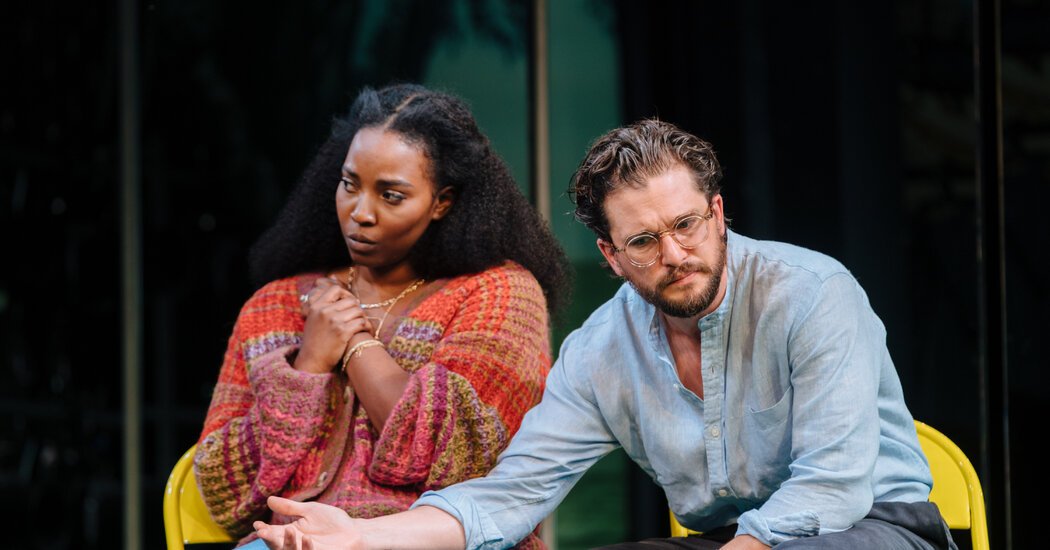Elaine Grant was pleased with the scene unfolding outside the Noël Coward Theater in London on Wednesday night.
Unlike most nights at the theater in the West End, there was a sea of majority Black faces laughing and jovially chatting in a line that snaked around the block before a performance of Jeremy O. Harris’s “Slave Play.”
Grant, who works in the arts, had organized a group of more than 100 people, mostly Black women, to see the show. “A lot of the people that I work with don’t necessarily go to the theater a lot,” she said, and so it was important for them to be in a space where they could feel safe experiencing a range of emotion.
This was a “Black Out” performance, an idea Harris first announced for his play’s Broadway 2019 run, in which he invites Black audience members to attend a specific performance, to experience and discuss art away from the white gaze. Joaquina Kalukango, an actress in the show’s New York run, told the Times in 2020 that she felt on those nights that she was performing to an audience “that fully understood the story and understood where these characters were coming from.”
In London, the mood on the theater steps was upbeat and there seemed little concern that when this “Slave Play” transfer — including two Black Out performances — was announced in February, it drew the wrath of some British commentators, and got caught up in ongoing debates over race in British cultural institutions. Even the office of the prime minister at the time, Rishi Sunak, chimed in, saying, “restricting audiences on the basis of race would be wrong and divisive.”
Harris responded to the widespread criticism on social media, addressing what he called a “moral panic” among parts of the British public.
“The portion of the population making this a moment of some sort of moral outrage are the same portion who barely engage with culture,” he said on X, “because to engage in it would challenge your anxious attachment to a past you never experienced but idealize.”
His play was for “people who want to see the audience around them look like the people in their neighborhood or from their tube ride.” (Harris did not reply to interview requests.)
“Slave Play,” which in 2020 earned a record-breaking 12 Tony nominations, examines the sex lives and taboo sexual fantasies of three interracial couples undergoing sex therapy while also exploring the lingering effects of slavery in America.
In Britain, debates over racism have consistently bubbled up since the death of George Floyd in May 2020. Both the Conservative government — which left office earlier this month — and right-wing commentators voiced opposition to cultural institutions reassessing how racism shaped Britain’s history, suggesting they were attacking the country’s national identity and becoming too “woke.”
In April, those same sentiments spurred a deluge of racist complaints about Francesca Amewudah-Rivers, a Black British actress, who was cast as Juliet opposite Tom Holland in Jamie Lloyd’s production of “Romeo and Juliet.”
Although critics pounced on “Slave Play’s” Black Out nights, such performances are not new to London: In 2022 Harris staged a similar night for his play “Daddy,” and other productions have followed in his footsteps, including Dave Harris’s “Tambo and Bones” in 2023, and the opera “Blue,” earlier this year.
Samia La Virgne, a drama lecturer at Royal Holloway, University of London, said there had been concerted, but flawed, recent efforts to make Britain’s theaters more inclusive. A recent report from Arts Council England found that just nine percent of British theater audience members described their ethnicity as mixed, Asian, Black or other.
The backlash earlier this year over the “Slave Play” Black Out performances signaled an “irrational fear,” La Virgine said, that more Black people in what have traditionally been predominately white spaces may shift power away from white and upper-class audiences.
La Virgne added that it was a business “no brainer” to extend invitations to demographics that do not usually come to the theater. “Your old white patrons, they will die soon,” she said. “There are more and more people of color and less and less white people.”
After the performance on Wednesday night, Harris and several cast members held a talkback, discussing the thinking behind the evening and taking some questions from the audience.
Outside the theater, Judith Amondi, who works in finance, was beaming with excitement over the play and her first Black Out experience. She said that because of the show’s sensitive topics, she only felt comfortable seeing “Slave Play” on a Black Out night: It was “a place where you felt you could be safe,” she said.
Ubah Egal, an actress who was in the audience, said that the Black Out night had different people to the theater, including a young Black man who told the audience during the talkback that this was the first time he’d seen a play.
“That boy was into it,” she said of his reactions throughout the show. “That boy is coming back to the theater because of this night.”
Read More: At ‘Slave Play’ in London, a ‘Black Out’ Night Emerges From Controversy


